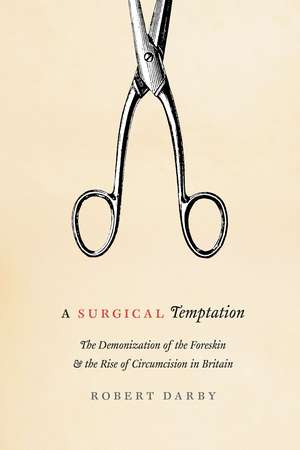A Surgical Temptation: The Demonization of the Foreskin and the Rise of Circumcision in Britain
Autor Robert Darbyen Limba Engleză Paperback – 5 sep 2013
In the eighteenth century, the Western world viewed circumcision as an embarrassing disfigurement peculiar to Jews. A century later, British doctors urged parents to circumcise their sons as a routine precaution against every imaginable sexual dysfunction, from syphilis and phimosis to masturbation and bed-wetting. Thirty years later the procedure again came under hostile scrutiny, culminating in its disappearance during the 1960s.
Why Britain adopted a practice it had traditionally abhorred and then abandoned it after only two generations is the subject of A Surgical Temptation. Robert Darby reveals that circumcision has always been related to the question of how to control male sexuality. This study explores the process by which the male genitals, and the foreskin especially, were pathologized, while offering glimpses into the lives of such figures as James Boswell, John Maynard Keynes, and W. H. Auden. Examining the development of knowledge about genital anatomy, concepts of health, sexual morality, the rise of the medical profession, and the nature of disease, Darby shows how these factors transformed attitudes toward the male body and its management and played a vital role in the emergence of modern medicine.
Why Britain adopted a practice it had traditionally abhorred and then abandoned it after only two generations is the subject of A Surgical Temptation. Robert Darby reveals that circumcision has always been related to the question of how to control male sexuality. This study explores the process by which the male genitals, and the foreskin especially, were pathologized, while offering glimpses into the lives of such figures as James Boswell, John Maynard Keynes, and W. H. Auden. Examining the development of knowledge about genital anatomy, concepts of health, sexual morality, the rise of the medical profession, and the nature of disease, Darby shows how these factors transformed attitudes toward the male body and its management and played a vital role in the emergence of modern medicine.
Preț: 237.99 lei
Preț vechi: 250.52 lei
-5% Nou
Puncte Express: 357
Preț estimativ în valută:
45.54€ • 47.55$ • 37.69£
45.54€ • 47.55$ • 37.69£
Carte tipărită la comandă
Livrare economică 04-18 aprilie
Preluare comenzi: 021 569.72.76
Specificații
ISBN-13: 9780226101101
ISBN-10: 022610110X
Pagini: 368
Dimensiuni: 152 x 229 x 28 mm
Greutate: 0.51 kg
Ediția:First Edition
Editura: University of Chicago Press
Colecția University of Chicago Press
ISBN-10: 022610110X
Pagini: 368
Dimensiuni: 152 x 229 x 28 mm
Greutate: 0.51 kg
Ediția:First Edition
Editura: University of Chicago Press
Colecția University of Chicago Press
Notă biografică
Robert Darby is an independent medical historian and freelance writer. His most recent books is an abridged edition of George Drysdale’s classic polemic against Victorian morality, Elements of Social Science. He lives in Canberra, Australia. Further information at www.historyofcircumcision.net.
Cuprins
Acknowledgments
Part I. The European Background
1. Introduction: The Willful Organ Meets Fantasy Surgery
2. The Best of Your Property: What a Boy Once Knew about Sex
3. Pathologizing Male Sexuality: The Masturbation Phobia and the Invention of Spermatorrhea
Part II. Medico-Moral Politics in Victorian Britain
4. The Shadow of Parson Malthus: Sexual Morals from the Georgians to the Edwardians
5. The Priests of the Body: Doctors and Disease in an Antisensual Age
6. A Source of Serious Mischief: William Acton and the Case against the Foreskin
7. A Compromising and Unpublishable Mutilation: Clitoridectomy and Circumcision in the 1860s
Part III. The Demonization of the Foreskin
8. One of the Most Grievous Diseases of Humanity: Spermatorrhea in British Medical Practice
9. The Besetting Trial of Our Boys: Finding a Cure for Masturbation
10. The Unyielding Tube of Flesh: The Rise and Fall of Congenital Phimosis
11. Prevention Is Better Than Cure: Sanitizing the Modern Body
12. The Purity Movement and the Social Evil: Circumcision as a Preventive of Syphilis
13. The Stigmata of a Gentleman: Circumcision and British Society
14. Conclusion: The End of the Culture of Abstinence
Notes
References
Index
Part I. The European Background
1. Introduction: The Willful Organ Meets Fantasy Surgery
2. The Best of Your Property: What a Boy Once Knew about Sex
3. Pathologizing Male Sexuality: The Masturbation Phobia and the Invention of Spermatorrhea
Part II. Medico-Moral Politics in Victorian Britain
4. The Shadow of Parson Malthus: Sexual Morals from the Georgians to the Edwardians
5. The Priests of the Body: Doctors and Disease in an Antisensual Age
6. A Source of Serious Mischief: William Acton and the Case against the Foreskin
7. A Compromising and Unpublishable Mutilation: Clitoridectomy and Circumcision in the 1860s
Part III. The Demonization of the Foreskin
8. One of the Most Grievous Diseases of Humanity: Spermatorrhea in British Medical Practice
9. The Besetting Trial of Our Boys: Finding a Cure for Masturbation
10. The Unyielding Tube of Flesh: The Rise and Fall of Congenital Phimosis
11. Prevention Is Better Than Cure: Sanitizing the Modern Body
12. The Purity Movement and the Social Evil: Circumcision as a Preventive of Syphilis
13. The Stigmata of a Gentleman: Circumcision and British Society
14. Conclusion: The End of the Culture of Abstinence
Notes
References
Index
Recenzii
"A Surgical Temptation reveals the history of practice, and the arguments for and against circumcision in the United Kingdom from the nineteenth to the twentieth century. Robert Darby has undertaken an extremely worthwhile topic that adds considerably to our knowledge of sexual attitudes and medical practices. It should be of interest to a wide range of audiences interested in the history of medicine, gender, and sexuality."
"Circumcision has a truly fascinating history, involving medicine and sexuality with some masculinity thrown in. Robert Darby's book provides exceptional detail and sound judgment about the modern evolution of the practice in Britain, in turn one of the most interesting national cases available. A very interesting study."
"If A Surgical Temptation were merely a history of circumcision in Britain, it would succeed. But it is much more than that. For Robert Darby, medical debates about circumcision become a window through which to address bigger themes—the ways in which medical attitudes about male sexuality developed and changed slowly from the eighteenth century to the middle of the twentieth century. And that really serves to make his even bigger claim—that through its effort to control men's sexuality and discussion about men's sexuality, modern British medicine began to constitute itself as a culturally legitimate expert knowledge."
"Left to its devices, the human male foreskin goes on its merry way, but Victorian England would have none of that. The uncircumcised penis was blamed for the 'moral and physical decay' of syphilis and masturbation, while doctors characterised the emission of sperm as 'a life-threatening illness that demanded drastic treatment if there was to be any hope of a cure'. Medical historian Robert Darby, . . . brilliantly records the rise of circumcision as 'a miracle-working cure-all' for many ills, including hysteria."
“Darby traces a gradual process that began in the 18th century with a ‘great fear’ of the moral and medical consequences of masturbation. . . . The principal value of Darby’s research lies in the detailed description, based on original sources, of changing attitudes toward sexuality and how, in turn, these attitudes changed the way physicians and nonphysicians viewed the human body.”
"This book should be required reading for American physicians in particular, especially those who continue to perform an operation seldom practiced in the rest of the world and who might not know why it was originally begun."
"A meticulously designed study, packed with historical detail. . . . A Surgical Temptation will be recognized as a major contribution to our understanding of the way beliefs about sexuality have shaped medical practice, and vice versa."
"Historians, ethicists, physicians, developmental biologists, and sociologists should find this book a fertile and provocative resource."
"In emphasizing the nonscientific reasons behind both the rise and fall of circumcision, Darby not only illuminates the historical background of this topic but reminds us of the often subjective nature of medical theories and practices. . . . Revealing the complex array of factors that lie behind the history of circumcision, Darby's work is of significance not only for students and historians of medicine, gender, and sexuality, but also for those engaged in current debates surrounding the practice itself."
"Darby's fascinating and detailed book both chronicles this grisly story and tries to explain it. . . . As a social history of the relations between public anxieties and professional establishments, Darby's book could hardly be bettered."
"Darby has written a marvellous read, judicious in his judgement, highly empathic in his reading and deep with insight. He shows the folly and sheer unnecessary butchery of circumcision."
"Darby has added a fascinating chapter to the history of sexuality by detailing the attitudes toward the foreskin and the rise of circumcision in Britain. . . . In addition to its careful attention to detail and its impressive range of observations, the book is largely a pleasure to read. Clear and carefully argued, it builds a case that is as fascinating as it is penetrating. . . . Awonderful study that I would recommend without qualification to historians of sexuality and medicine."











